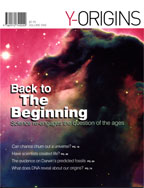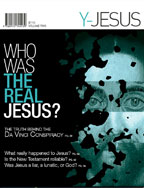FINGERPRINTS OF A DESIGNER?
Several materialists have taken issue with Behe’s case for irreducible complexity, but none have adequately explained a process by which such complex organs and systems have evolved by mere chance.
Surprised at the sudden maelstrom caused by his book, Behe defends his position in The Boston Review. “The rotary nature of the flagellum has been recognized for about 25 years. During that time not a single paper has been published in the biochemical literature even attempting to show how such a machine might have developed by natural selection.”10
In The Flagellum Unspun, Ken Miller argues against irreducible complexity, labeling Behe and other intelligent design advocates, “unimaginative.”
Dr. William Dembski rebuts Miller’s objection by stating, “The problem is not that we in the intelligent design community…just can’t imagine how those systems arose.…Darwin’s theory, without which nothing in biology is supposed to make sense, in fact offers no insight into how the flagellum arose.”11
James Shapiro, a biochemist at the University of Chicago, concurs, “There are no detailed Darwinian accounts for the evolution of any fundamental biochemical or cellular system, only a variety of wishful speculations.”12
Darwin’s Black Box is a scientific book, not a theological one, but Behe has been joined by a growing number of scientists who claim they see the fingerprints of intelligent design within irreducibly complex biological systems. One of them, cosmologist Alan Sandage has remarked: “The world is too complicated in all its parts and interconnections to be due to chance alone. … The more one learns of biochemistry the more unbelievable it becomes unless there is some type of organizing principle—an architect for believers.”13
Back | Endnotes | Next
|




